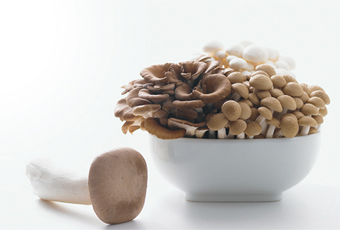Lubricating Nutrients

The nutrients contained within food are categorized into the “big three nutrients” (proteins, fats and sugars), which form the basis of muscles and energy, and “lubricating nutrients” (vitamins and minerals), which are essential for the metabolism and support of the big three nutrients. Sufficient intake of these allows us to build a healthy body.
Use mushrooms to obtain efficient intake of lubricating nutrients, which tend to be deficient
According to the 2016 National Health and Nutrition Survey, children’s and adults’ vitamin and mineral intake is overall insufficient. Unconscious attainment of required amounts of the big three nutrients, found in abundance in main meals and rice, tends to be easy, however that is not the case for lubricating nutrients (vitamins and minerals). If you wish to achieve the efficient intake of lubricating nutrients, incorporating foods that are full of vitamins and minerals, such as mushrooms, into your meals is the number one way. Mushrooms supply not only lubricating nutrients, but also dietary fiber (aka the 6th nutrient), providing a balanced meal.
Highly nourishing! Mushrooms are packed full of vitamins and minerals!
Among the lubricating nutrients found within mushrooms, B vitamins, well known for producing energy and supporting skin cell turnover, are exemplary. There’s several, including: vitamin B1, which burns sugar converting it into energy; B2, which stimulates the metabolism of fats; B6, which assists with the metabolism of proteins; and folic acid, which helps cell generation. In addition, mushrooms also contain large amounts of vitamin D, which raises calcium absorption, essential for the creation of a strong body, and minerals such as potassium, magnesium and lead, which take part in the metabolism of energy, and support the efficient intake of lubricating nutrients.
